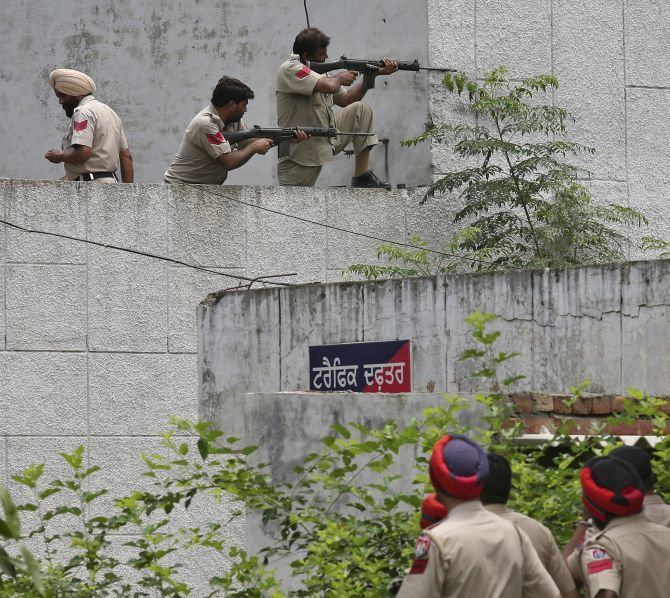If the talks fail to move forward -- as is most likely -- India has retained the option of unleashing a disproportionate response in the coming weeks on the border, reveals Nitin A Gokhale.
 India is going into the National Security Adviser-level talks on Sunday, August 23, with full awareness that Pakistan is doing its best to wriggle out of the commitment made at Ufa when the two prime ministers met in July.
India is going into the National Security Adviser-level talks on Sunday, August 23, with full awareness that Pakistan is doing its best to wriggle out of the commitment made at Ufa when the two prime ministers met in July.
Top government sources privy to India's approach at the talks say New Delhi has decided to go ahead with the commitment to have talks on terror despite grave Pakistani provocations.
Heightened ceasefire violations, the Pakistani invite to the Kashmiri separatists and allegations of India's involvement in Baluchistan, all are seen as deliberate attempts to provoke India into cancelling the talks, sources said.
Aware of the Pakistani attempt to divert and deflect from the core agenda agreed to at Ufa, the Indian decision-makers have decided to call Pakistan's bluff and go ahead with the scheduled talks on Sunday.
"Our old stand that terror and talks cannot go hand in hand stays. However, we need to engage Pakistan on the issue of terror and therefore these talks are a must," top government sources said, revealing the approach.
India is planning to pin down Pakistan using evidence on terror financing, terror infrastructure, and the links of the terrorists with the Pakistani establishment.
The recent attacks in Gurdaspur and Udhampur and the revelations made by the captured terrorist Naved will be high on the agenda, sources added.
The Indian side is treating Sunday's talks as the last chance in its current efforts to clinch peace with Islamabad.
"If Pakistan fails to respond appropriately to our overtures, we retain the option to break off talks and then evolve another strategy," sources said.
India has so far refrained from responding to Pakistani provocations because the government is confident about its own stand and there are no differences among various stake holders on the policy vis-a-vis Pakistan. By contrast, multiple voices continue to emanate from Pakistan on dealing with India.
While in India, the Pakistan policy is under the prime minister's control, it is the Pakistani army that calls the shots on that country's Kashmir policy. This has resulted in Pakistan's NSA's feeble attempts to wriggle out of the promises made at Ufa and bring in extraneous factors into the NSA level talks, Indian policy makers point out.
If the talks fail to move forward -- as is most likely -- India has retained the option of unleashing a disproportionate response in the coming weeks on the border. But all that will be dependent upon what transpires at Sunday's meeting.
IMAGE: Policemen take positions next to a police station during a gunfight with terrorists at Dinanagar town in Gurdaspur district. Photograph: Munish Sharma/Reuters










